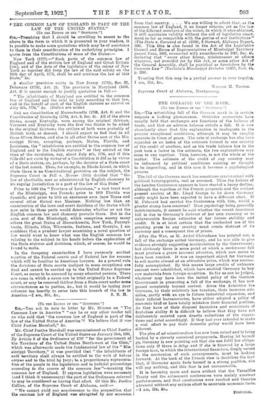[To THE EDITOR OF THE " SPECTATOR."3 Sni,—You ask in
note to letter by Mr. Stinson on " The Common Law in America " " can he or any other reader tell us who said that the common law of England is part of the law of the United States of America'? We believe that it was Chief Justice Marshall," &c.
Mr. Chief Justice Marshall was commissioned as Chief Justice of the Supreme Court of the United States on January 31st, 1801. By Article 2 of the Ordinance of 1787 " for the government of the Territory of the United States North-west of the Ohio," 'which was afterwards made the fundamental law of the " Mis- sissippi Territory," it was provided that " the inhabitants of said territory shall always be entitled to the writ of habeas corpus and to the trial by jury; to a proportionate representa- tion of the people in the legislature and to judicial proceedings according to the course of the common law "—meaning the common law of England. If express legislation were necessary (and I think it'unnecessary) the part of the Ordinance referred to may be considered as having that effect. Of this Mr. Justice Collier, of the Supreme Court of Alabama, said
" We cannot yield our acquiescence to the proposition that the common law of England was abrogated by our secession from that country. . . . We are willing to admit that, as the common law of England, it no longer obtains, yet as the law of the different members of the union, in which it once obtained, it still maintains validity without the aid of legislative enact. ment so far as compatible with the genius of our institutions " (The State v. Carwood et at. (1830), 2 Stewart, Alabama Report, 360). This idea is also found in the Act of the Legislative Council and House of Representatives of Mississippi Territory passed June, 1802, se-enacted with amendments in 1807, Seo. 45, declaring that " every other felony, misdemeanor or offense whatever, not provided for by this Act, or some other Act of the General Assembly, shall be punished as heretofore by the Common Law " (Toulmin's Mississippi Statutes (1807), Sect. 45, p. 324).
WILLIAM H. TEMA& Supreme Court of Alabama, Montgomery.


































 Previous page
Previous page